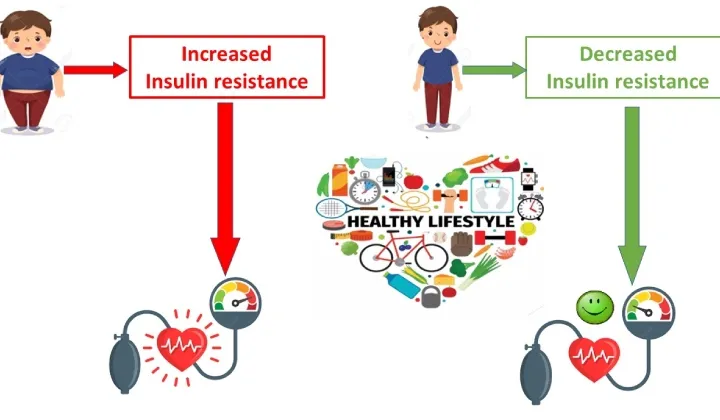Insulin resistance is a metabolic disorder that lies at the heart of numerous health issues, including type 2 diabetes, obesity, and cardiovascular diseases. It occurs when the body’s cells become less responsive to the hormone insulin, which is crucial for regulating blood sugar levels. In this article, we will delve into the intricacies of insulin resistance, exploring its causes, symptoms, and, most importantly, effective strategies for prevention.

Understanding Insulin Resistance: What It Is
At the core of the body’s energy management system lies insulin, a hormone produced by the pancreas. Insulin plays a pivotal role in facilitating the absorption of glucose (sugar) from the bloodstream into cells, where it’s used for energy or stored for later use. Insulin resistance disrupts this process, causing cells to respond inadequately to insulin signals. As a result, the body produces more insulin to compensate, leading to higher levels of insulin in the blood.

Causes of Insulin Resistance
Obesity: Excess body fat, especially around the abdomen, is strongly linked to insulin resistance. Adipose tissue releases substances that interfere with insulin’s effectiveness.
Sedentary Lifestyle: Physical inactivity contributes to insulin resistance by impeding glucose uptake by muscles. Regular exercise enhances insulin sensitivity.
Genetics: Family history can predispose individuals to insulin resistance. Genetic factors influence how efficiently cells use insulin.
Poor Diet: Diets high in refined sugars, unhealthy fats, and processed foods can contribute to insulin resistance. These foods lead to rapid spikes in blood sugar levels, putting stress on the body’s insulin response.
Inflammation: Chronic inflammation, often associated with obesity, can disrupt insulin signalling pathways and contribute to insulin resistance.
Symptoms of Insulin Resistance
In the early stages, insulin resistance might not show noticeable symptoms. However, as the condition progresses, the following signs may manifest:
High Blood Sugar: Elevated blood sugar levels are a hallmark of insulin resistance and can lead to prediabetes or type 2 diabetes.
Fatigue: Cells not getting enough glucose translate to lower energy levels, causing persistent fatigue.
Increased Hunger: Insulin resistance can trigger excessive hunger, especially for sugary and carbohydrate-rich foods.
Weight Gain: Difficulty in maintaining a healthy weight or unexplained weight gain can be indicative of insulin resistance.
Darkened Skin Patches: A condition called acanthosis nigricans, characterized by darkened patches of skin, often around the neck or armpits, might develop.
Effective Prevention Strategies
Balanced Diet: Focus on a diet rich in whole foods, including vegetables, fruits, lean proteins, whole grains, and healthy fats. Minimize consumption of sugary beverages, processed foods, and refined carbs.
Regular Exercise: Engage in regular physical activity, aiming for a mix of aerobic exercises, strength training, and flexibility exercises. Exercise enhances insulin sensitivity and aids in weight management.
Weight Management: Maintaining a healthy weight reduces the risk of insulin resistance. Even modest weight loss can have significant benefits.
Portion Control: Be mindful of portion sizes to avoid overeating, which can contribute to weight gain and insulin resistance.
Stress Management: Chronic stress can worsen insulin resistance. Practice stress-reducing techniques such as meditation, yoga, or deep breathing.
Adequate Sleep: Prioritize getting 7-9 hours of quality sleep each night, as poor sleep patterns can disrupt insulin sensitivity.
Limit Alcohol Consumption: Excessive alcohol intake can interfere with blood sugar regulation. If you choose to drink, do so in moderation.
Regular Check-ups: Periodic medical check-ups can help detect insulin resistance early, allowing for timely intervention.
For those grappling with type 2 diabetes, effective diabetes care management is key. Regular monitoring of blood sugar levels using sugar testing machine strips offers insight into how dietary choices and lifestyle impact glucose control. This proactive approach allows for timely adjustments to insulin doses, dietary choices, and exercise routines, contributing to better overall diabetes management.
Read More: Amazing Tips on How to Take the Insulin Shot
Collaboration in Diabetes Care
Effective diabetes care management requires a collaborative effort between individuals and healthcare providers. Regular check-ups enable healthcare professionals to monitor progress, adjust treatment plans, and provide guidance in navigating the challenges posed by insulin resistance and diabetes.
In conclusion, insulin resistance is a critical health concern with far-reaching consequences. However, armed with the knowledge of its causes, symptoms, and effective prevention strategies, individuals can take proactive steps to mitigate their risk.
By adopting a healthy lifestyle encompassing balanced nutrition, regular exercise, stress management, and adequate sleep, the journey towards preventing insulin resistance and its associated complications becomes not only feasible but empowering. Remember, small, consistent changes today can lead to a healthier tomorrow.
Disclaimer:The content of this article is compiled information from generic and public sources. It is in no way a substitute, suggestion, or advice for a qualified medical opinion. Always consult a specialist or your own doctor for more information. BeatoApp does not claim responsibility for this information .
Dr. Navneet Agarwal is an established and highly skilled Diabetology with over 25 years of experience in Diabetology & Obesity. He is well-regarded for his quality and patient-centered diabetes care. Also, keep track of your blood sugar levels with a Doctors’ approved smart glucometer and elevate your healthcare routine.




